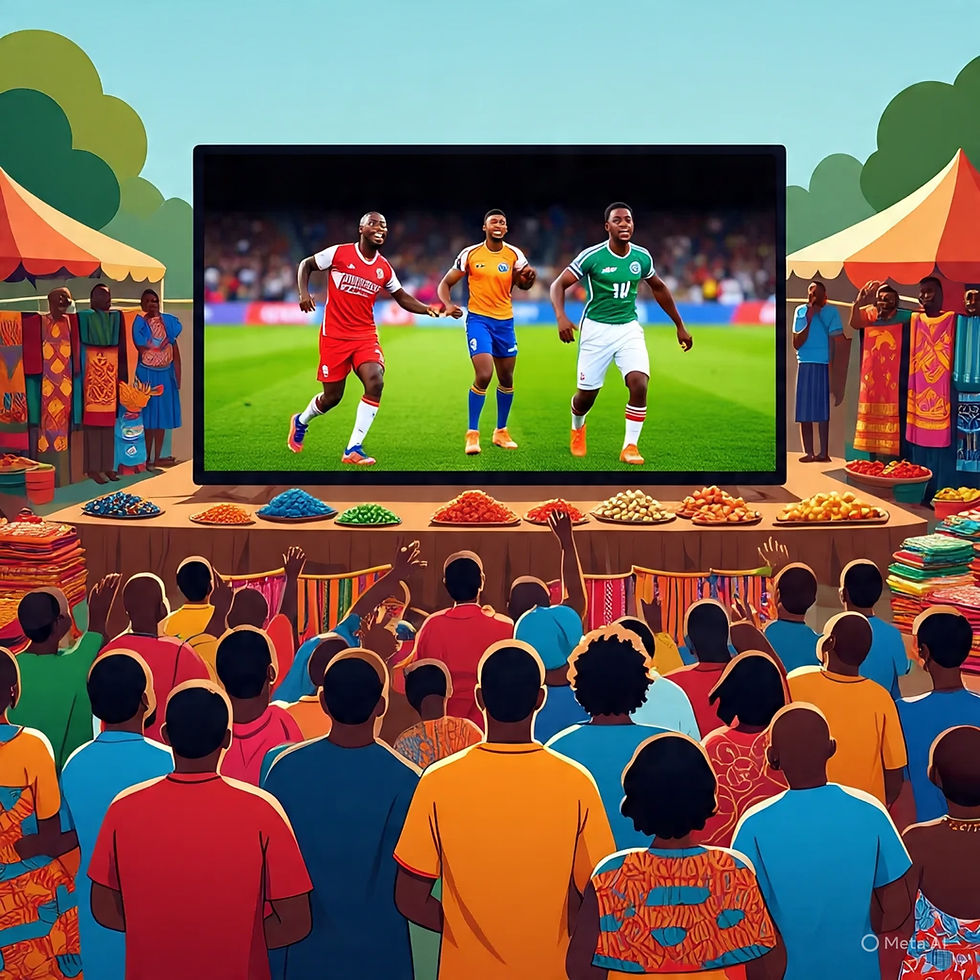The English Premier League: A Masterclass in Football Management, Marketing, PR, and Lessons for African FAs
- orpmarketing
- May 16, 2025
- 6 min read

The English Premier League (EPL) isn’t just a football league—it’s a global phenomenon, a slick, multi-billion-pound machine that’s redefined what a sports organization can be. Since its inception in 1992, the EPL has transformed from a domestic competition into a worldwide brand, watched by over 4.7 billion people annually across 200 countries. Its success isn’t just about goals and trophies; it’s about visionary management, cutting-edge marketing, and savvy public relations. For African football associations like those in Ghana, Nigeria, and South Africa, the EPL offers a blueprint for turning passion for football into sustainable, global success. Let’s dive into how the EPL operates, its strategies, its teams, and what African FAs can learn to elevate their own game.
The EPL’s Management: A Model of Modern Governance
The EPL’s management structure is a well-oiled system that balances competitive integrity with commercial ambition. Unlike many leagues, it operates independently of the English Football League (EFL), giving it autonomy to innovate. Here’s how it works:
Decentralized Leadership: The EPL is governed by its 20 member clubs, each with a vote on major decisions. This democratic approach ensures buy-in from stakeholders but avoids the chaos of micromanagement. A board, led by a CEO, handles day-to-day operations, while clubs focus on their own strategies.
Sporting Directors and Specialized Roles: The days of the all-powerful manager (think Sir Alex Ferguson) are fading. Clubs like Arsenal and Manchester United now employ sporting directors, technical directors, and heads of football operations to oversee transfers, scouting, and long-term strategy. For example, Arsenal’s shift from Arsène Wenger’s singular control to a team of nine department heads shows how roles are split to enhance efficiency.
Financial Fair Play (FFP): The EPL enforces FFP rules to ensure clubs don’t overspend recklessly, maintaining competitive balance. This has helped stabilize clubs, though some, like Newcastle United post-2021 Saudi takeover, push the boundaries with massive investments.
Youth Development: The Elite Player Performance Plan (EPPP), introduced in 2012, revolutionized youth academies. Category 1 academies (like Manchester City’s) receive more funding and contact time with players, fostering talents like Phil Foden. The EPPP’s holistic approach—covering technical, physical, psychological, and social development—is a benchmark for nurturing homegrown stars.
This structured yet flexible management allows the EPL to adapt to challenges like hooliganism (now largely eradicated through strict security and fan engagement) and financial disparities among clubs. African FAs, often plagued by governance issues, can learn from this clarity and professionalism.
Marketing: Turning Football into a Global Brand
The EPL’s marketing strategy is a masterclass in turning a sport into a cultural juggernaut. It’s not just about selling matches; it’s about selling a lifestyle. Here’s how they do it:
Segmentation and Targeting: The EPL targets a broad audience, primarily males aged 15–60, but it’s clever about localization. In Nigeria, for instance, vibrant viewing centers in Lagos and Abuja tap into communal passion for football. The league tailors content for different markets—think Arsenal’s “Visit Rwanda” sponsorship, which boosted brand visibility in East Africa despite controversy.
Positioning as the Elite: The EPL markets itself as “the most competitive soccer league,” a tagline backed by its unpredictable title races and iconic rivalries like Manchester United vs. Liverpool or the North London Derby. This positioning creates a premium brand image, attracting sponsors like Adidas and Chevrolet.
Digital Dominance: With 98.8% of global social media users accessing platforms via mobile, the EPL and its clubs lean heavily into digital marketing. Arsenal, for example, boasts 77.8 million followers across platforms, with 37.7 million on Facebook alone. Clubs use Instagram, Twitter, and TikTok to share behind-the-scenes content, player stories, and fan challenges, fostering global engagement.
Sponsorship and Merchandising: The EPL generates billions through sponsorships (e.g., Manchester United’s £900m Adidas deal) and merchandising, from jerseys to branded mugs. Pitch-side LED boards offer high-value ad space, seen by millions worldwide.
African FAs, particularly in Nigeria and Ghana, could adopt this global marketing mindset. Leveraging social media to showcase local stars like Thomas Partey or Mohammed Kudus could expand their reach beyond borders.
Public Relations: Humanizing the Game
The EPL’s PR strategy is about more than damage control—it’s about building emotional connections. Clubs and the league use PR to humanize players and engage communities:
Community Engagement: Initiatives like Arsenal’s diversity programs or Liverpool’s charity work showcase players’ off-pitch contributions, making them relatable. For example, Marcus Rashford’s campaign for free school meals in the UK earned global praise, boosting Manchester United’s image.
Crisis Management: The EPL has faced controversies, like Newcastle’s Saudi ownership and accusations of “sportswashing.” Transparent communication and fan engagement help mitigate backlash, though ethical concerns persist.
Global Storytelling: The EPL crafts narratives around rivalries (e.g., Manchester United vs. Manchester City) and historic moments (Arsenal’s 2003–04 “Invincibles” season) to keep fans hooked. These stories resonate in Africa, where fans cherish memories of players like Nwankwo Kanu.
For African FAs, PR could be a game-changer. Ghana’s Black Stars, for instance, have a passionate fanbase but struggle with consistent messaging. A structured PR campaign could turn setbacks, like their 2025 AFCON qualification failure, into stories of resilience.
The Teams: The Heart of the EPL
The EPL’s 20 teams for the 2024/2025 season—Arsenal, Aston Villa, Bournemouth, Brentford, Brighton, Chelsea, Crystal Palace, Everton, Fulham, Ipswich, Leicester, Liverpool, Manchester City, Manchester United, Newcastle, Nottingham Forest, Southampton, Tottenham, West Ham, and Wolves—are its lifeblood. Each club brings unique flavor:
Big Six Dominance: Manchester United, Manchester City, Liverpool, Arsenal, Chelsea, and Tottenham drive the league’s global appeal. Their rivalries, like the Manchester Derby, are box-office events that influence title races and European qualification.
Newcomers and Underdogs: Promoted teams like Ipswich Town face the daunting task of avoiding relegation. Historically, clubs like Blackburn Rovers (1992/93) defied odds to stay up, showing the league’s competitive depth.
African Stars: Players like Nigeria’s Wilfred Ndidi (Leicester) and Ghana’s Thomas Partey (Arsenal) keep African fans glued to the EPL. Liverpool’s Mohamed Salah and Sadio Mané have made the club a favorite in Egypt and Senegal.
The diversity of teams, from global giants to scrappy underdogs, keeps the EPL unpredictable and engaging.
Lessons for African FAs: Ghana, Nigeria, and South Africa
African football associations, particularly those in Ghana, Nigeria, and South Africa, face challenges like corruption, underinvestment, and outdated infrastructure. The EPL’s success offers actionable lessons:
Governance and Transparency: The EPL’s professional management builds trust, attracting investors. Nigeria’s Football Federation (NFF) could adopt clear role definitions (e.g., sporting directors) to reduce mismanagement, which has hampered their World Cup campaigns. Ghana’s FA, reeling from a 2025 AFCON qualification miss, needs similar accountability.
Infrastructure Investment: The EPL’s modern stadiums enhance fan experience and revenue. South Africa, with World Cup-ready venues from 2010, could lead the way but needs consistent maintenance. Nigeria and Ghana must prioritize upgrading facilities like Lagos’ Teslim Balogun Stadium.
Global Marketing: The EPL’s social media dominance shows how digital platforms can expand reach. Ghana’s FA could promote the Black Stars’ history (four AFCON titles) to attract sponsors like UniBank, which already backs them with $5m deals. Nigeria’s Super Eagles, with stars like Victor Osimhen, could target global audiences via platforms like Instagram.
Youth Development: The EPPP’s focus on holistic player growth is a model for Africa. South Africa’s PSL clubs could invest in academies to produce the next Benni McCarthy, while Nigeria’s 1996 Olympic gold success shows the potential of youth investment.
PR and Fan Engagement: The EPL’s storytelling keeps fans invested. Ghana and Nigeria could use PR to celebrate rivalries like the “Battle of Supremacy” between the Black Stars and Super Eagles, boosting fan engagement and revenue.
Challenges and Considerations
The EPL isn’t perfect. Its reliance on foreign investment (e.g., Newcastle’s Saudi deal) raises ethical questions, and the financial gap between top clubs and smaller ones grows. African FAs must avoid similar pitfalls, ensuring local stakeholders retain control while embracing global opportunities. Additionally, while the EPL’s commercialization is a strength, African FAs must balance profit with cultural authenticity to maintain fan loyalty.
Conclusion: A Playbook for African Football
The EPL’s rise from a hooligan-plagued league to a global powerhouse is a testament to smart management, innovative marketing, and compelling PR. For Ghana, Nigeria, and South Africa, the lessons are clear: professionalize governance, invest in infrastructure, embrace digital marketing, nurture youth talent, and tell compelling stories. By adapting these strategies, African FAs can transform their domestic leagues and national teams into global contenders, just as the EPL has done. The ball’s in their court—time to kick it.




Comments